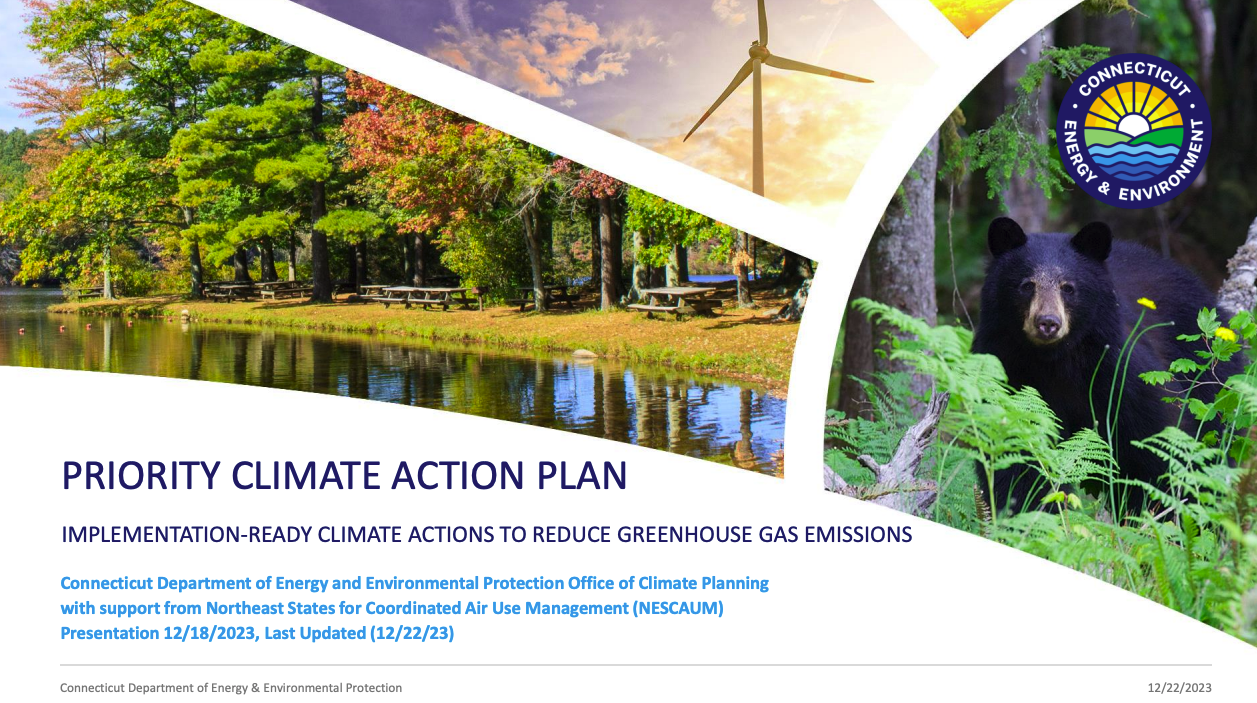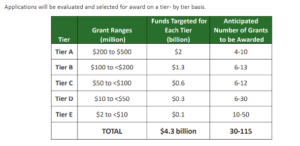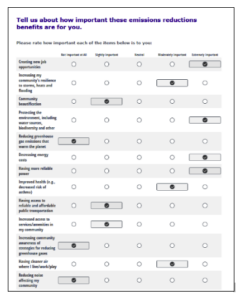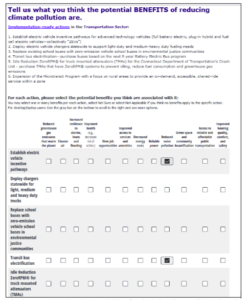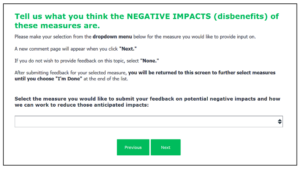The Department of Energy & Environmental Protection (DEEP) is requesting public comments from Connecticut residents by midnight Friday, Jan.12, regarding the Environmental Protection Agency’s (EPA) Climate Pollution Reduction Program, which was established under the 2022 federal Inflation Reduction Act (IRA).
Under this program, Connecticut received $3 million from the EPA to research emission and pollution reduction programs. The federal agency has $4.6 billion (though the table below accounts for only $4.3 billion) available for state and local governments to compete for by submitting Implementation Grant proposals due April 1, 2024. The EPA notes that it will prioritize projects in “disadvantaged communities” as designated by this IRA map.
DEEP is considering 14 total measures in its proposal the EPA, in 4 categories:
Transportation:
- School Bus Electrification: replace Connecticut’s 2000 diesel school buses in “environmental justice areas” with zero emitting electric buses.
- Transit Bus Electrification: replace diesel transit buses with electric transit buses.
- Establish electric Vehicle Incentives: expand the existing CHEAPR program, which offers rebates for fully electric and plug-in hybrid vehicles.
- Deploy Electric Vehicle Chargers statewide: install electric vehicle chargers for cars, SUVs, small and medium pick-up trucks, delivery vans, and other medium sized vehicles.
- Install “idle reduction systems” in Connecticut Dept. of Transportation Crash Unit trucks, which protect road construction crews from traffic.
- Expand Shared Ride Program: increase access to on-demand and accessible shared-ride services by expanding the Microtransit program (small buses), focusing on rural areas.
Buildings:
- Support Adoption of Residential and Commercial Heat Pumps to replace gas and fuel oil heating systems.
- Expand Funding for Residential Energy Preparation Services (REPS), weatherization of buildings.
- Expand Energy Efficiency Programs to help homes and businesses save energy and money with rebates, financing, and other services for energy efficiency and clean energy improvements.
- Networked Geothermal Heating Systems to replace gas and fuel oil heating systems.
Electric power:
- Energy Storage with batteries and Demand Response, in which residences/businesses can reduce electricity usage and receive a rebate
- Hydrogen For Port Operations and Storage: replace diesel trucks with zero emission hydrogen fueled trucks at ports.
Miscellaneous:
- Food Scrap Diversion: fund cities and towns to implement food scrap diversion programs.
- Plant trees in urban areas to reduce pollution, increase shade, and store carbon.
Since I joined Yankee Institute back in April, DEEP has been something of an enigma to me, creating news headlines with the frequency to suggest that they were almost a fourth branch of state government by themselves (albeit one far more insulated from public sentiment and pesky elections). This interest peaked a few months ago when DEEP brazenly insisted that there was broad public support for a ban on gas and car truck bans, despite all evidence to the contrary. So when I heard about this survey, I was intrigued.
I began filling out the survey, which laid out what the 14 benefits could achieve. When asked to “tell us about how important these emissions reductions are to you” I prioritized “affording a reliable vehicle,” and “access to a good paying job” which to me are both more important than a “lack of trees that provide shade,” among other options. Of all of the “benefits,” I am most skeptical of the potential for this program to “reduce greenhouse gas emissions to warm the planet,” since Connecticut contributes a pittance to global emissions.
After that I was asked about the “potential benefits of reducing climate pollution” for each of the 14 proposals. Of course, this assumes these benefits will actually be realized from the program. The program will indeed create “new job opportunities” (the number of jobs created from massive federal infusions of money easily creates government jobs, but doesn’t have a great track record in the private sector) until the federal money dries up. If this happens, then Connecticut may have to use state taxpayer money to fund these jobs because there is no demand for such jobs outside of federal government grants. I would love to see “decreasing energy costs” but given the rapid increases in energy costs that have coincided with adoption of green policies (like the Renewable Portfolio Standard), I’m a little skeptical this will happen.
Despite these very leading questions about the benefits of such proposals, DEEP did surprise me at two points toward the end of the survey.
“Tell us what you think are the NEGATIVE IMPACTS (disbenefits) of these measures are.” Ah yes, “disbenefits.” Or as we plebians call them “costs.” Still, this was more than I was expecting from DEEP. Perhaps the overwhelming negative response to the gas car ban made them a little more self-reflective.
I selected “Transit Bus Electrification” and wrote the following:
“Lithium ion battery fires place passengers and drivers at risk, as was seen in the Hamden electric bus fire of 2022. More research is necessary to weigh the costs and benefits of adopting electric vehicles, most especially electric buses.”
I then selected “increased adoption of heat pumps statewide” to write:
Heat pump technology is not at a point where it can replace standard heating options, like heating oil and natural gas. Forcing disadvantaged communities to rely on this technology risks the health (and perhaps even the very lives) of low-income individuals if they rely entirely on electricity to heat their homes (especially in the event of electric blackouts, which could become more frequent).
Finally, the survey asked about potential barriers to these 14 policies, which was another surprise.
Was it worth my time? That remains to be determined. These types of surveys tend to be flooded by climate zealots eager to let their voice be heard. But perhaps a few voices of reason will let money flow to the most beneficial proposals and less to the more ill-conceived ones.
You can fill out the survey here yourself until 11:59 pm on Friday, Jan.12. https://www.surveymonkey.com/r/CT_CPRG
